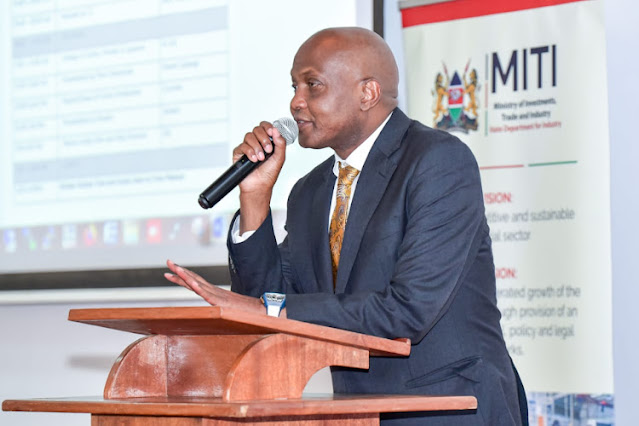 |
| Moses Kuria, the Trade Cabinet Secretary |
Moses Kuria, the Trade Cabinet Secretary, has stated that he will put forward the establishment of additional levies on imported clothing to support the development of the regional textile sector.
Kuria claimed that Kenya has a thriving textile industry that needs to be developed for the benefit of Kenyans.
The moment has come for us to expand our textile business for the greater good of Kenyans, Kuria said. “In the next Finance Bill or even earlier, I will propose a new 25% levy on imported clothes.”
According to him, Kenyans shouldn’t rely primarily on imported clothing and instead should consider it a luxury.
On Monday, Kuria addressed participants in the textile industry at a symposium in Eldoret.
The CS acknowledged that Mitumba traders would object to such duties on imported clothing, but he pointed out that this was due to the fact that they were never provided with access to inexpensive sources of clothing.
“I concur with the Mitumba traders since we haven’t provided them with a different option. There are no less expensive locally made garments for them to sell,” he claimed.
Kuria, however, declared that he will continue with the implementation of the additional taxes on imported clothing due to its favourable long-term effects on the textile industry.
Although there was a backlash, Kuria remarked, “We have done the same with some of our building supplies that can be produced locally, and we cannot go back because our primary focus is on domestic businesses.”
He said that despite Kenya’s tremendous promise in the textile industry, its citizens shouldn’t be compelled to depend solely on overseas clothing.
The CS invited participants in the garment trade to play their part in reviving the sector and improving local farmers’ livelihoods.
“Our farmers are eager and prepared to contribute to the production of cotton. They will generate plenty if we just provide them with what they need,” according to Kuria.
He said that the textile industry, which barely employs 50,000 people but has the potential to employ millions, is a dysfunctional system.
According to Kuria, people working in the textile industry enjoy special advantages and ought to make use of them.

